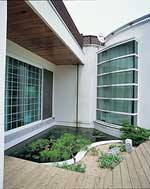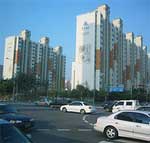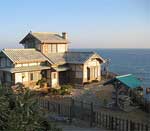Tax on property income in South Korea
Tax Rate on Rental Income |
|||
| Monthly Income | €1,500 | €6,000 | €12,000 |
| Tax Rate | 0.00%* | 0.00%* | 0.00%* |
| Click here to see a worked example | |||
| *Please see article for more information Source:Global Property Guide | |||
INDIVIDUAL TAXATION
A nonresident foreigner can hold Korean property through a ´limited liability company´ (YooHan hoesa). This requires no company registration, only tax registration with the tax authority. Rental income can be taken out of the country after taxes have been paid.
Income Tax
Income is classified according to the following: global income, retirement income, capital gains, and income taxed separately by withholding. Global income is taxed at progressive rates while retirement income and capital gains are taxed separately at different rates.
The following falls under the global income classification: interest income (excluding interest taxed separately), dividend income (excluding dividends taxed separately), real estate rental income, business income and professional income, employment income, and other income. Taxable income is computed as gross income less all allowable deductions and allowances. Income is then aggregated and taxed at progressive rates.
INCOME TAX 2023 |
|
| TAXABLE INCOME, KRW | TAX RATE |
| Up to 12 million | 6% |
| 12 million - 46 million | 15% |
| 46 million - 88 million | 24% |
| 88 million - 150 million | 35% |
| 150 million - 300 million | 38% |
| 300 million - 500 million | 40% |
| 500 million - 1 billion | 42% |
| Over 1 billion | 45% on all income over 1 billion |
| Source: Global Property Guide | |
Rental Income
 Rental income realized by individuals through a personal company is taxed at progressive rates and no nil-rate band deduction is allowable against rents from real estate. Taxable income is based on total rental income, deducting allowable expenses and losses carried over within five years.
Rental income realized by individuals through a personal company is taxed at progressive rates and no nil-rate band deduction is allowable against rents from real estate. Taxable income is based on total rental income, deducting allowable expenses and losses carried over within five years.
Korea has a self-assessment tax system, under which each taxpayer is required to file a tax return and pay the proper amount of tax by the due date as prescribed by the individual income tax law. Tax returns must include supporting documents to be eligible for personal exemptions and deductions.
There are two methods of computation for the personal taxable income:
- Case 1: Income - (income * expense rate for real estate rental business which is between 20% and 66%). This is applicable only if the rental income is under KRW24 million (US$21,622).
- Case 2: Income - major expenses (income * expense rate for real estate rental business which is between 15% and 48%). Major expenses consist of labor costs, purchase costs, and rental costs.
The National Tax Service (NTS) releases the expense rates annually.
If the rental income is less than KRW24 million (US$21,622) and the property value is assumed to be under KRW900 million (US$810,811), the first case applies in the calculation of the personal taxable income. In the sample calculation provided, effective income tax amounts to 2.48% of the gross rent, if the annual rental income is KRW20.7 million (US$18,649) and under certain assumptions.
Value Added Tax (VAT)
Income from leasing real property is also subject to value added tax. VAT is payable by the landlord at 10%.
Inhabitant Tax
Individuals are required to pay a 10% surcharge on their income tax, which is called the inhabitant tax. The tax base is the individual´s income tax liability.
Capital Gains
Individuals, including personal companies earning capital gains when selling properties are subject to capital gains tax at progressive rates.

The taxable gain is computed by deducting the following from the gross amount: necessary expenses (acquisition costs, improvement costs, transfer costs, and other capital expenditures), special deduction for the holding period, and standard deductions for capital gains. There is no inflation-adjustment of capital gains.
A special deduction from the gross amount is also given for long-term holding and the deduction rate depends on the number of years the property was held:
SPECIAL DEDUCTION FOR CAPITAL GAINS |
|
| HOLDING PERIOD | DEDUCTION |
| 3 years - 4 years | 10% |
| 4 years - 5 years | 12% |
| 5 years - 6 years | 15% |
| 6 years - 7 years | 18% |
| 7 years - 8 years | 21% |
| 8 years - 9years | 24% |
| 9 years - 10 years | 27% |
| Over 10 years | 30% |
| Source: Global Property Guide | |
There is a standard capital gains deduction of KRW2.5 million (US$2,252) for every year the property was held.
CORPORATE TAXATION (´Stock Company´)
The process of company formation is somewhat time-consuming, requiring three to four days´ work at least, and notarized documents submitted from the home country. Annual accounts are also complex, but an annual fee of US$1,000 should suffice for a small accountant.
Advantages:
- Depreciation allowances are available on a 30%-50% straight line basis; potentially substantially reducing income tax liabilities;
- Annual corporate taxes are likely to be lower than the equivalent income tax would be, if the investment is large.
Disadvantages:
- Registration and administration are complex; annual costs include accountancy costs of probably no less than US$1,000 p.a., plus 1.44% of the paid-up capital.
- There are no capital gains tax allowances or deductions on sale, and all depreciation allowances claimed must be deducted from the initial value of the property to arrive at the net capital gain.
Corporate Income Tax
A ´stock company´ (JooSik hoesa) or a corporation pays tax on its income and capital gains at the standard corporate tax rates.
INCOME TAX 2023 |
|
| TAXABLE INCOME, KRW (US$) | TAX RATE |
| Up to 200 million (US$180,180) | 10% |
| 200 million – 20 billion (18,018,018) | 20% on band over US$180,180 |
| 20 billion – 300 billion (US$270,270,270) | 22% on band over US$18,018,018 |
| Over 300 billion (US$270,270,270) | 25% on all income over US$270,270,270 |
| Source: Global Property Guide | |
Income-generating expenses and operating expenses are all deductible. Deductions include salaries, interest expense, taxes and fees, advertising costs, depreciation of fixed assets, and deficits for the previous five years.
Depreciation. Corporations are required to use the straight-line method when depreciating. The law sets out ´standard useful lives´ of buildings (e.g., steel-framed buildings have a ´standard useful life´ of 40 years). Taxpayers may select useful lives of depreciable assets within a range from 75% to 125% of the standard useful lives prescribed in the law.
A corporation must file a tax return within three months of the last day of the business year. It must attach a balance sheet, an income statement, a surplus appropriation statements, and other documents. A domestic corporation whose business year exceeds six months is liable to interim tax payment by the end of the second month from the end of the interim period (i.e., 6 fiscal months), which depends on the amount of tax it paid the previous year.
Inhabitant Tax
CIO The tax base is the company´s income tax liability.
PROPERTY TAX
Property Tax

Annual property taxes are levied between 0.15% to 0.50%, depending on location, type of building, etc. To counter speculation, the government proposes to raise sharply the property tax base of apartments in designated speculation areas.
GENERAL COMBINED PROPERTY TAX |
|
| TAX BASE, KRW (US$) | TAX RATE |
| Up to 50,000 (US$45) | 0.20% |
| 50,000 - 100,000 (US$90) | 0.30% |
| Over 100,000 (US$90) | 0.50% |
| Source: Global Property Guide | |
SPECIAL COMBINED PROPERTY TAX |
|
| TAX BASE, KRW (US$) | TAX RATE |
| Up to 200,000 (US$180) | 0.20% |
| 200,000 - 1 million (US$900) | 0.30% |
| Over 1 million (US$900) | 0.40% |
| Source: Global Property Guide | |
Separate property taxes can be levied:
- Land is generally taxed at 0.20%
- Buildings are generally taxed at 0.25%
- House villas are taxed at 4%
- Houses other than villas are taxed at progressive rates, from 0.15% to 0.50%
PROPERTY TAXES ON HOUSES (OTHER THAN VILLAS) |
|
| TAX BASE, KRW (US$) | TAX RATE |
| Up to 40,000 (US$36) | 0.15% |
| Up to 40,000 - 1 million(US$900) | 0.30% |
| Over 1 million (US$900) | 0.50% |
| Source: Global Property Guide | |
Comprehensive Real Estate Holding Tax
Property owners whose properties exceed a certain threshold amount are liable to pay the comprehensive real estate holding tax.
Comprehensive real estate tax is levied between 0.5% and 2% for residential houses that exceed KRW600 million (US$540,541).
COMPREHENSIVE REAL ESTATE HOLDING TAX ON RESIDENTIAL HOUSES |
|
| TAX BASE, KRW (US$) | TAX RATE |
| Up to 600 million (US$540,541) | 0.50% |
| 600 million - 1.2 billion (US$1,081,081) | 0.75% |
| 1.2 billion - 5 billion (US$4,504,505) | 1.00% |
| 5 billion to 9.4 billion (US$8,468,469) | 1.50% |
| Over 9.4 billion (US$8,468,469) | 2.00% |
| Source: Global Property Guide | |
Comprehensive real estate holding tax is levied at different rates, depending on the classification of land.
COMPREHENSIVE REAL ESTATE HOLDING TAX ON LAND |
|
| TAX BASE, KRW (US$) | TAX RATE |
| Up to 1.5 billion (US$1,351,351) | 0.75% |
| 1.5 billion - 4.5 billion (US$4,054,054) | 1.50% |
| Over 4.5 billion (US$4,054,054) | 2.00% |
| Source: Global Property Guide | |
COMPREHENSIVE REAL ESTATE HOLDING TAX ON LAND ATTACHED TO BUILDINGS |
|
| TAX BASE, KRW (US$) | TAX RATE |
| Up to 20 billion (US$18,018,018) | 0.50% |
| 20 billion - 40 billion (US$36,036,036) | 0.60% |
| Over 40 billion (US$36,036,036) | 0.70% |
| Source: Global Property Guide | |